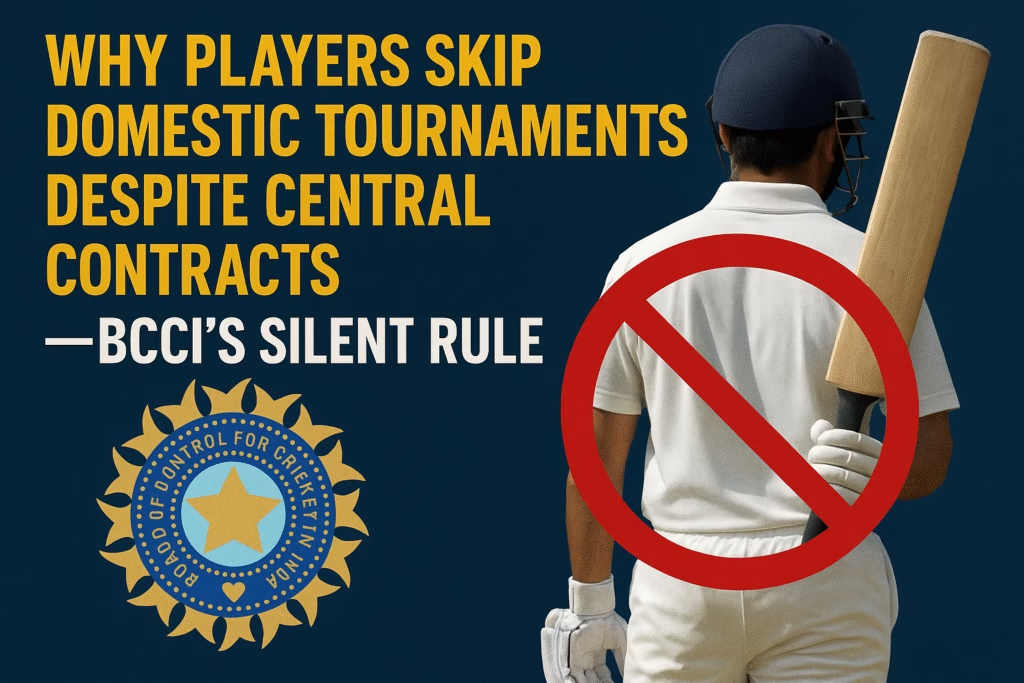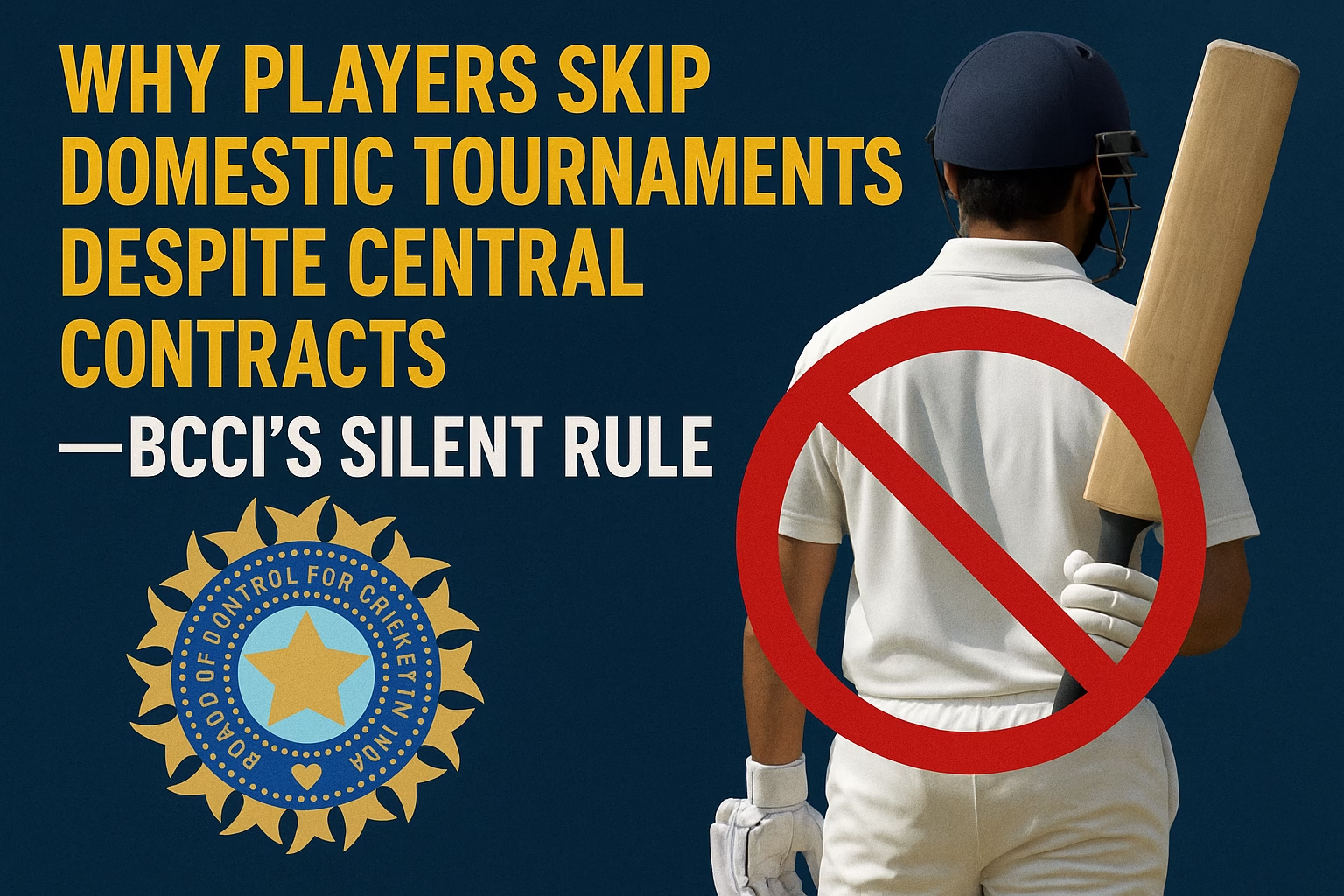Introduction: The Curious Case of Missing Stars
The Ranji Trophy has begun. Crowds are enthusiastic and stadiums are prepared, but the stars are not there. The cricket community is taking notice as India’s top players once again skip domestic competitions. Many elite players still choose to opt out even though they are bound by central contracts. Discussions about this have taken place in newsrooms, on social media, and in the halls of the selection committee.

So the question arises—why do players skip domestic tournaments despite central contracts?
Workload and scheduling aren’t the only factors. There is another, more subtle layer—an unwritten rule within the BCCI that many insiders are aware of but very few discuss. The reality of this mystery is examined in this article, along with its long-term effects on Indian cricket and its hidden policies and dressing room politics.
The True Significance of Central Contracts
To understand why players skip domestic tournaments despite central contracts, we first need to understand what central contracts entail.
Players are divided into four groups by the BCCI: A+, A, B, and C. Annual retainers and bonuses based on performance are included in each category. However, it also entails expectations, such as competing in domestic competitions when unable to serve or injured.
The rule is obvious on paper. However, in reality? The plot changes at that point.
Officially required but unofficially disregarded
When not on international duty, centrally contracted players must play domestic cricket, according to several statements made by the BCCI. However, top players continue to skip Syed Mushtaq Ali or Ranji Trophy games each year without providing a public explanation.
The board either sidesteps questions or provides evasive answers, such as “workload management,” “niggling injuries,” or “rest advised by team physio.” However, if you look a little closer, you’ll discover the tacit tolerance that explains why players skip domestic tournaments despite central contracts.
The “Silent Rule” of Prioritization
There is an unwritten hierarchy in Indian cricket, according to a number of insiders and former players. This is how the understanding works:
“You’re too valuable to risk in domestic cricket if you regularly play for your country.”
Star players can skip games without facing official consequences thanks to this unspoken agreement. Because of this, elite players frequently watch from the sidelines, even when healthy and available. This explains why players skip domestic tournaments despite central contracts, even though the rules technically require it.
Recent Examples That Sparked Debate
The Ranji season of 2023–2024 saw:
KL Rahul, Virat Kohli, and Rohit Sharma are missing important games.
Rather than playing for Jharkhand, Ishan Kishan is training in Baroda.
Despite being cleared by the NCA, Shreyas Iyer is receiving criticism for missing games.
Fans were incensed about each case, and even selectors voiced their worries. The discrepancy between player behavior and board expectations is more pronounced than ever before, and it has become impossible to ignore the question of why players skip domestic tournaments despite central contracts.
Players vs. Selectors: An Increasing Divide
The selector-player equation is what makes this problem more tense. The selection committee allegedly confronted a few players who were missing Ranji games under ambiguous pretexts at the beginning of 2024. However, no disciplinary action was taken.
This demonstrates how inconsistently the BCCI enforces its own rules, which helps to explain why players skip domestic tournaments though they have central contracts. The pattern will continue if stars are not held accountable by the system.
IPL Rotation Policy: Why Star Players Are Getting Rested So Often in 2025
Effect on the Bench Strength of Team India
There are significant ramifications to this trend. Real-time learning is denied to young athletes who might gain from playing with or against seniors. The difference between domestic and international standards grows, and domestic cricket is relegated to a second-tier competition.
Coaches have frequently noted that players who struggled in their first international matches frequently did not receive enough exposure to challenging games. This can be fixed with full participation and a stronger domestic setup. Yet, why players skip domestic tournaments despite central contracts continues to undermine that potential.
The Role of IPL in Shifting Priorities
The IPL is among this debate’s most contentious topics. Players frequently skip domestic competitions, claiming rest or injury, but weeks later they seem fully recovered for the IPL.
When critics wonder why players skip domestic tournaments in spite of central contracts, this contradiction is frequently brought up. The allure of money and glamour of the IPL Representing one’s state doesn’t seem to be as motivating.
A former cricket player for India stated, “You can’t get hurt playing for Ranji and then blow it in the IPL two weeks later.” “That’s preference management, not workload management.”
Domestic Players’ Voices from the Rural area
Now, a number of household mainstays have started to express their annoyance. For them, the senior players’ absence:
lowers the game’s quality
Reduces public interest
destroys chances for selection
“If our own India stars don’t value these games, why should fans come to watch or sponsors come to invest?” a Bengali player recently asked in an interview.
Another consequence of players skip domestic tournaments in spite of central contracts is the decline in prestige and morale.
Fans Demand Accountability
The backlash on social media is becoming louder. Fans are calling for transparency on Reddit and Twitter (now X). They want to know why a player isn’t playing domestic cricket if they aren’t injured and not representing India.
The answer always circles back to that same point: why players skip domestic tournaments despite central contracts is linked more to silent privilege than performance or policy.
What the BCCI Is Able to Do
The BCCI needs to do the following if it is serious about making domestic cricket relevant again:
- Make participation agreements enforceable rather than merely suggestive.
- Apply penalties or contract reviews for uncalled-for absences.
- Transparently publish injury reports and fitness updates.
- Encourage domestic performance in order to extend the contract.
This clarification would restore trust in the system and eliminate uncertainty regarding why players skip domestic tournaments despite central contracts.
The Rahul Dravid Model: Set an Example
Even after being dropped from the national team or during breaks, he made it a point to show up for Karnataka. This example of leadership demonstrated a great deal of respect for the domestic circuit and the game.
The stars of today need to consider that legacy. The current generation ought to respect the Ranji Trophy, just as Dravid and Tendulkar did. That’s the only sustainable way to eliminate the question of why players skip domestic tournaments despite central contracts from Indian cricket.
The Bottom Line: Reputation vs Responsibility
Cricket is a game of values as much as numbers. Being a member of one’s state team is a badge of honor, not a burden. That honor is gradually being undermined by the silent rule that permits players to opt out without facing any repercussions.
The BCCI needs to stop ignoring the situation if it wants to alter the narrative. It must transform central contracts into instruments of accountability rather than merely financial records.
Until then, one of the most awkward realities of Indian cricket will continue to be the reasons why players skip domestic tournaments despite central contracts.
Conclusion: Time to Walk the Talk
It’s time for Indian cricket to start acting like what it says. Domestic cricket needs to be treated fairly and with dignity if it is to be the foundation of national selection. The message that certain rules only apply to a select few is conveyed by each game a player skips without a good reason.
This can still be fixed. However, it begins with acknowledging that why players skip domestic tournaments in spite of central contracts is a cultural problem rather than merely a scheduling one. Additionally, culture is created one choice at a time, just like reputation.
Call to Action
📢 What’s your take on this issue?
Do you support mandatory domestic appearances for all players under central contracts?
Let us know in the comments and share this article to keep the conversation alive.

